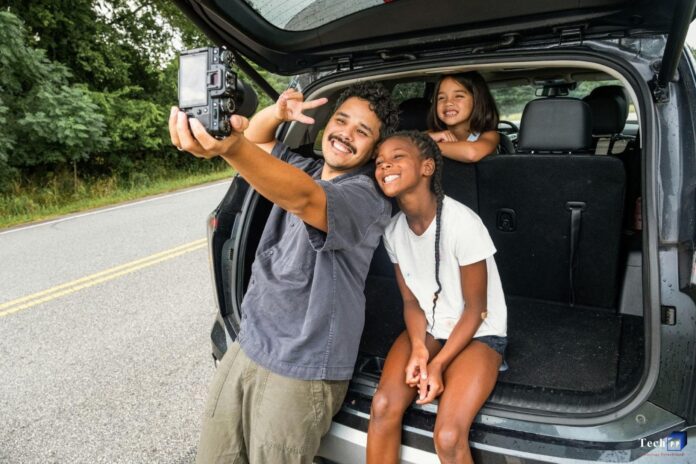Car Comfortable! Traveling with children means your car has to do more than move you from point A to point B—it needs to keep everyone comfortable, secure, and calm throughout the ride. Whether you’re doing daily school drop-offs, weekend family trips, or long-distance drives, the setup of your vehicle plays a major role in how smooth the journey feels. From seating support to in-car entertainment and smart storage, small changes can make every ride easier on both kids and parents.Photo by Samsung Memory US on Unsplash
Prioritizing Safety First
Choosing the Right Car Seats
Age-appropriate seating should always be the foundation of a kid-friendly car. Rear-facing seats are recommended for infants and t oddlers because they offer better neck and spine protection in a crash.
Once kids outgrow those, forward-facing seats with harnesses take over. Older children should use booster seats until they reach the correct height and weight for standard seat belts. Make sure seats are installed tightly and positioned correctly—most safety issues stem from improper setup, not the equipment itself.
Securing Belts and Buckles
Even with older kids, double-check seat belts. The shoulder strap should sit across the chest and not under the arm or behind the back. Remind kids that slouching or twisting in the seat reduces protection. Do a quick belt check before pulling out of the driveway so you’re confident everyone is locked in properly.
Window and Door Locks
Child-safety locks prevent accidental openings and protect kids from injury. Activate both window and door locks when driving with young passengers. This simple step keeps little hands from making unsafe moves while you’re focused on the road.
Creating a Comfortable Seating Setup
Supportive Seating and Cushions
Kids can become restless quickly when seated too long. Cushioned seat covers or ergonomic booster pads improve comfort on long drives. Adjustable headrests reduce neck strain and provide better posture support, especially for kids prone to napping in the car.
Climate Control for All Seats
Backseat climates often feel different from the front. If your car doesn’t offer individual rear climate controls, use clip-on vents or fans so the air circulates properly. In colder months, warm blankets or seat liners help maintain comfort without blasting the front heater.
Keeping the Interior Clean and Organized
Smart Storage Solutions
Mess leads to stress, especially with younger kids. Car seat organizers, backseat pockets, and foldable bins make it easier to contain toys, snacks, wipes, and water bottles. When everything has a place, you avoid clutter stepping into safety zones like seat buckles, belts, or footwells.
Easy-Clean Surfaces
Choose seat covers and floor mats made of wipeable materials. Crumbs, spills, and dirt are inevitable, so prioritize fabrics and liners that can be cleaned quickly without needing a full wash.
Maintaining a Pleasant Environment
Odor Control and Freshness
Bad smells can make any trip feel uncomfortable. Using a long-lasting car scent creates a fresh and neutral backdrop that keeps the car inviting for everyone. Kids often bring leftover snack smells, shoes, and gym gear into the vehicle, so this small addition makes a noticeable difference over time.
Air Quality and Ventilation
Crack windows where possible or use vent settings that circulate air evenly. Consider adding a small air purifier if anyone in the family has allergies. Good airflow can reduce motion sickness and keep tired kids more relaxed.
Entertainment Without Chaos
Hands-Free Tech Setup
Mounted tablets or headrest screens allow children to watch shows or movies without holding devices. Use secure mounts and headphones to minimize distractions and keep volume under control. Avoid handing over loose electronics that can become projectiles in sudden stops.
Offline Activities
Not every trip calls for screen time. Activity books, travel games, fidget toys, or drawing pads help pass the time. Store them in a pocket organizer so kids can reach them easily without shouting from the back seat.
Healthy Snacks and Hydration
Pack Quick and Clean Options
Mess-free snacks like fruit slices, granola bars, or crackers prevent hunger meltdowns without turning the backseat into a disaster zone. Use containers with lids and give each child their own cupholder space where possible.
Keep Drinks Secure
Spill-proof bottles save time and reduce cleanup. Hydration keeps kids calm and less prone to irritability, especially on long drives.
Minimizing Motion Sickness
Strategic Seating
Kids prone to motion sickness usually do better when seated in the middle back seat, facing forward and with a clear view of the road. This helps stabilize their vision and reduces dizziness.
Ventilation and Scents
Fresh air is key to preventing nausea. Opening a window slightly or directing vents toward the back helps manage discomfort. For some families, adding a long-lasting car scent with subtle, natural notes can help neutralize odors that trigger queasiness.
Night and Long-Distance Comfort
Lighting and Napping
Soft interior lights make it easier for kids to read, relax, or play without strain after dark. If you plan for naps, use window shades or blankets to block light and keep sun from hitting their faces.
Travel Pillows and Blankets
Neck pillows keep kids from slumping and straining muscles while sleeping. Lightweight blankets help maintain comfort without heating the entire car.
Communication and Calm
Set Expectations Before Driving
Before starting any trip, remind kids about basic rules like staying buckled, keeping noise reasonable, and not throwing objects. Simple guidelines reduce chaos, especially when siblings share the backseat.
Calm Music or White Noise
Playing soft playlists or nature sounds can reduce stress levels and make rides feel smoother. It’s especially helpful on early morning commutes or during evening drives home.
Emergency-Ready Essentials
Stock a Travel Kit
Keep a small kit with wipes, tissues, sanitizer, bandages, sunscreen, and motion sickness meds in the console or trunk. Add an extra outfit for young children in case of unexpected spills or accidents. Knowing you’re prepared means you can handle setbacks without panic.
Roadside Preparedness
Store a flashlight, first aid kit, jumper cables, and a blanket in the trunk. Even if you rarely use them, having them in place ensures you’re never scrambling in a stressful moment.
ALSO READ: Tribupneu Technology: Innovation in Motion
Encourage Independence Safely
Hooks and Holders
Install hooks behind seats for backpacks or coats. Letting older kids grab their own things reduces your multitasking and keeps the car uncluttered.
Clear Foot Space
Objects rolling around on the floor can lead to tripping or tangled feet. Keep footwells free of toys and bags so kids can get in and out safely.


